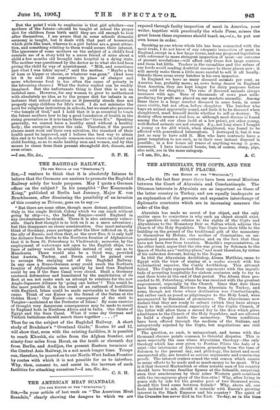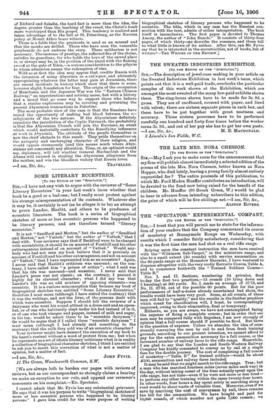THE ABYSSINIANS, THE COPTS, AND THE HOLY PLACES.
[TO THE EDITOR OF THE " SPECTAT010]
Srn,—In the last four years there have been several Missions between the Court of Abyssinia and Constantinople. The Ottoman interests in Abyssinia are as important as those of the latter country in Tarkey, and are equally inadequate as an explanation of the presents and expensive interchange of diplomatic courtesies which are in increasing measure the order of the day.
Abyssinia has made no secret of her object, and the only matter open to conjecture is why such an object should exist. The question at issue relates to the rights of the Copts and Abyssinians to the Monastery Deir es Sultan which adjoins the Church of the Holy Sepulchre. The Copts base their title to the building on the ground of the traditional gift of the monastery to themselves by Helena, the mother of Constantine, on un- questioned possession for centuries, and on the fact that they have not been free from taxation. Menelik's representatives, on the other hand, argue that the site was given by Solomon to the Queen of Sheba as a " resting-place," and must therefore, by virtue of his unbroken descent, belong to the Negus.
In 1902 the Abyssinian Archbishop, Abuna Matthias, came to Egypt with the view of aiming at a modus vivendi with his ecclesiastical superior, the Coptic Archbishop. This attempt failed. The Copts reproached their opponents with the ingrati- tude of accepting hospitality for sixteen centuries only to try to oust their hosts at the end of that period. The Abuna then pro- ceeded to St. Petersburg, where he was received with the greatest empressement, especially by the Church. Since that date there have been continual Missions from Abyssinia to Turkey, and some, though not those whose destination was Constantinople, but rather such as posed as pilgrimages to the Holy Land, were accompanied by Russians of prominence. The Abyssinians now declare that they are ready to submit (which they have always done) to the ecclesiastical superiority of the Coptic Church, if the latter will allow them a second key to the door which gives admittance to the Church of the Holy Sepulchre, and are allowed to build a chapel inside the monastery. These conditions have been offered through the medium of the Italians, and categorically rejected by the Copts, but negotiations are still proceeding. The question, as such, is unimportant, and teems with the thousand obscure points common to Oriental disputes. This is more especially the case where Abyssinian theology—the only theology which has ever given to Pontius Pilate the halo of a saint—the intricacies of Abyssinian genealogy from the time of Solomon to the present day, and philology, the latest and most unexpected ally, are treated as serious arguments and convincing proofs. The interest centres round the real reason which causes so many efforts to be made and so much money to be spent. Why is it that General Machachiah or other notable men of his country should have become familiar figures at the Selamlik, surprising even that anachronism by their sober Western garb combined with the incongruous glory of the lion-skin ? Why, after living in peace side by side for the greater part of two thousand years, should this feud come between friends? Why, above all, one feels inclined to ask, should it coincide with Russia's growing interest in the Black Emperor and hie country? The spirit of the Crusades has never died in the East. To-day, as in the time
of Richard and Saladin, the hard fact is more than the idea, the dogma greater than the teaching of the creed, the Christ's tomb more worshipped than His gospel. This tendency is realised and taken advantage of to the full at St. Petersburg, as the Russian policy at Mount Athos bears witness.
There is a fable that the peninsula is used as an arsenal and that the monks are drilled. Those who have seen the venerable greybeards do not endorse the story. There militarism is not necessary. The increase of prestige, the reflected fire of the shrine, satisfies its guardians, for who holds the keys of the sacred place is, or always may be, in the position of the angel with the flaming swot d at the gate of Eden,—a serious consideration to the pilgrim to whom admission means the redemption of sins.
Wild as at first the idea may appear that credits Russia with the intention of using Abyssinia as a cat's-paw, and ultimately appropriating whatever the latter may gain at Jerusalem, there are recent incidents in history which show that there is some, however slight, foundation for fear. The origin of the occupation of Manchuria and the Japanese War was the " Eastern Chinese Railway," an unpretentious and retiring name, but with a history and a moral that go some way to support those who believe that a similar euphemism may be covering and governing the present Abyssinian transactions in Palestine. The more probable view of the case is that the Russians have seized the opportunity of making bad blood between the co- religionists of the two nations. If the Abyssinians definitely repudiate the jurisdiction of the Coptic Patriarch, the probability is that the Abyssinian Church will join the Russians, an event which would materially contribute to the Russifying influences at work in Abyssinia. The attitude of the people themselves is now the chief obstacle to this result. They pride themselves on the antiquity and unchanging character of their religion, and would oppose strenuously (and this means much where Abys- sinians are concerned) any alteration. Time, or, an optimist would say, diplomacy, will tell whether General Machachiah and the Abuna will succeed in stealing the Abyssinian allegiance from the mother, and win the bloodless victory that Russia loves.











































 Previous page
Previous page